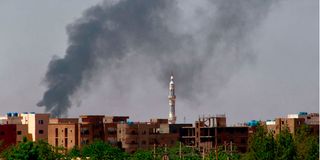Free movement of people still a big thorn as African Union celebrates 60 years

The conflict in Sudan in which over 800 people have been killed, about 4,000 internally displaced and about 200,000 crossing to neighbouring countries—is the latest headache to the AU.
As the African Union celebrates its 60th anniversary on May 25, the noble idea of the free movement of people, goods and services is yet to be achieved.
The continent started a week-long celebration from May 22 that will go on till May 28 but so far 46 out of the 55 member states have deposited the instruments of ratification of the African Continental Free Trade Area (AfCFTA) launched in 2018 to promote the free movement of goods and services within the continent, The intra-Africa trade still remains at a meagre 15 percent.
Not all the 55 member states have taken seriously the Protocol on the free movement of persons, with only three countries offering visa-free to all African Countries- Seychelles, Benin, and The Gambia. About 26 percent of Africans do not need a visa to travel to other African countries on special arrangements.
Also known as “Africa Day”, May 25 has always been celebrated in what the release from the AU Secretariat says, “In recognition of the vision and milestone achieved towards an Integrated, Prosperous and Peaceful Africa, driven by its own citizens and representing a dynamic force in the global arena.”
Peace and dignity
“Africans Rising”, a global Pan-African movement of people and organisations working for Unity, Justice,
Peace and Dignity have taken up the campaign to mobilise the free movement of persons across the continent through the slogan, “Borderless Africa”.
Hardi Yakubu, a Ghanaian who is the coordinator of “Africa Rising”, says that it is unfortunate, that protocol for free movement has not gotten publicity as AfCFTA.
“Just about four countries have ratified as opposed to 15 countries for it to enter into force. So, borderless Africa is complimentary for the campaign for the ratification of that other protocol, so that we can have a completely free movement framework for the development of Africa and economic emancipation and progress of our peoples, he said.
Last year, under the theme “Africa for Africans”, the African Liberation Week mobilisation engaged in more than 500 actions across 46 countries in Africa and the diaspora. This year, Africa Rising has mobilised over 400 co-organized and self-organised activities and events registrations across African towns and communities and diaspora drawn from this year's theme and sub-themes.
“It is also important that more countries ratify the free movement protocol because it is the people who move with their labour, skills, and services. We cannot be advocating the free movement of goods without commentary free movement of persons,” said Mr Yakubu.
He says that the main theme for this year is mobilisation for borderless Africa, but they are also pushing other sub-themes such as fighting about economic inequality and injustice, climate crisis, and gender justice. The motive for having these sub-themes is to highlight how they are linked.
“When we talk about borderless Africa is about people’s ability to completely decolonise the movement of people across the continent because these borders were created by the colonialists. We want to see an Africa where there is equality, ability to deal with a climate not to affect our livelihood,” he said.
Silencing of the gun
African leaders while marking the 50th Anniversary in 2013 came up with the silencing of the gun initiative as part of the African Agenda 2063 with the leaders resolving not to pass the burden of conflict to future generations.
The objective was to free the African continent of wars, civil conflicts, humanitarian crises, human rights violations, gender-based violence and genocide.
Yet, insecurity brought about by wars and internal has increased since 2020 with the resurgence of coup d'états, resource-related instability, and conflicts in regions like the Great Lakes Region, as well as intra-state conflicts like those in South Sudan, Libya, Ethiopia, and Cameroon.
But the guns keep on blazing with the emergence of new conflicts in Sudan, and Ethiopia and the escalation of old ones in the Democratic Republic of Congo (DRC), South Sudan, and Somalia.
The conflict in Sudan in which over 800 people have been killed, about 4,000 internally displaced and about 200,000 crossing to neighbouring countries—is the latest headache to the AU.





